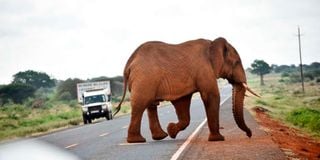Premium
Nema approves Sh125m fence to control Tsavo park elephants

An elephant crosses the Tsavo East game drive along the Voi-Mwatate-Taveta road.
The National Environment Management Authority (Nema) has approved the setting up of an electric fence to seal off a hole at a section of Tsavo East National Park which borders Makueni County.
Nema Director-General Mamo Boru Mamo approved the project after studying a report on the impact of the fence on the environment. The assessment now paves way for the installation of the two-strand elephant extrusion fence along River Mtito Andei.
Makueni County government is installing the 20-kilometre fence in collaboration with Tsavo Trust, an organisation which runs a conservancy in the area. They have two years to complete the project, according to Mr Mamo.
The county government has set aside Sh75 million in the 2021/2022 financial year, according to Environment Executive Julius Kaloi. Tsavo Trust has pledged an additional Sh50 million for the fencing project.
Human-wildlife conflict
"The fencing does not represent a direct boundary demarcation but it is purely for mitigating human-wildlife conflict in the community settled area," reads one of the conditions accompanying the approval licence which Nema issued on July 22.
The approval of the fencing comes as desperate residents threatened to take matters in their own hands in the wake of heightened attacks by elephants in the region. They have been demanding for action by Kenya Wildlife Service (KWS) rangers.
The jumbos, which reportedly roam the villages in herds of more than 20 daily, have destroyed acres of crops, houses and water tanks. They also disrupt learning in schools bordering the park and terrorise residents.
Ms Christine Syombua, a rain water harvesting champion who had turned her farmland in Yindundu Village into an oasis teeming with assorted fruit trees, is among the latest victims of the heightened human-wildlife conflict.
"The elephants destroyed all the bananas, papayas and avocados in our orchard and damaged an expensive irrigation system," a distraught Ms Syombua recently told the Nation at her farm.
Food aid
Apart from losing her only source of livelihood, Ms Syombua has joined hundreds of her neighbours who are in dire need of food aid following the destruction of their crops by elephants.
Tourism and Wildlife Cabinet Secretary Najib Balala pledged to increase KWS patrols in the Mtito Andei region following a heightened outcry after a rogue elephant killed a man in the region early this year. The wildlife agency enlisted a team of rangers from its Problematic Animals Management Unit to deal with the problem.
They pitched tent in the area but soon left after being unable to handle the situation, leaving behind the overwhelmed ordinary KWS teams patrolling the sprawling region.
It is now believed that the solar-powered fence will bring to an end the age-old problem of human-wildlife conflict in the region.





